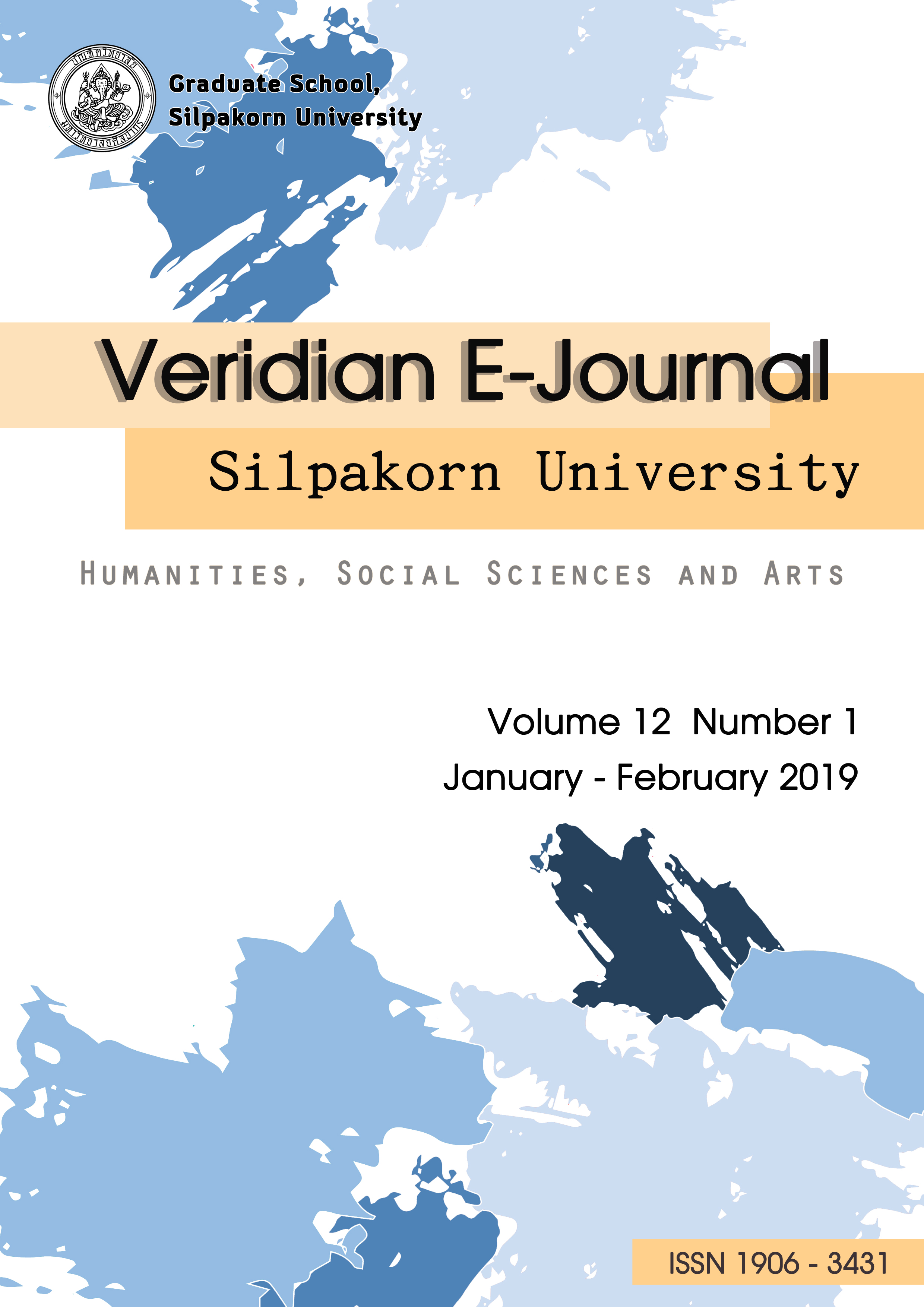นักศึกษากับการเคลื่อนไหวทางการเมืองในวันครบรอบ 1 ปี การทำรัฐประหารของ พลเอกประยุทธ์ จันทร์โอชา (The Political Movement of Students with Regards to the One-year Anniversary of the Coup d'état of General Prayuth Chan-Ocha)
Main Article Content
บทคัดย่อ
การศึกษาวิจัยครั้งนี้เป็นการศึกษาการเคลื่อนไหวทางการเมืองของนักศึกษาในกิจกรรมครบรอบ การทำรัฐประหาร 1 ปีของรัฐบาลพลเอกประยุทธ์ จันทร์โอชา ภายใต้ชื่อกิจกรรม “ศุกร์ 22 มาฉลองกันมะ?” โดยมีวัตถุประสงค์ คือ 1) เพื่อศึกษาปัจจัยที่ส่งผลต่อการจัดกิจกรรม “ศุกร์ 22 มาฉลองกันมะ?” ของนักศึกษา 2) เพื่อศึกษารูปแบบและกลยุทธ์ในการเคลื่อนไหวทางการเมืองของนักศึกษาในกิจกรรม“ศุกร์ 22 มาฉลองกันมะ?” โดยใช้วิธีวิจัยเชิงคุณภาพ
ผลการศึกษาพบว่า ปัจจัยที่ส่งผลต่อความคิดทางการเมืองมากที่สุด คือ การเข้าเรียนในสถาบันอุดมศึกษาที่มากกว่าการกล่อมเกลาผ่านครอบครัว ผู้ให้ข้อมูลสำคัญส่วนใหญ่มีประสบการณ์การเคลื่อนไหวทางการเมืองโดยเฉพาะการเป็นผู้จัดกิจกรรม ภายใต้กลุ่มนักศึกษา ๆ ที่เชื่อในอุดมการณ์เสรีประชาธิปไตย การถูกจำกัดสิทธิและเสรีเภาพป็นปัจจัยที่สำคัญในการบ่มเพาะแรงต้านจนนำไปสู่การจัดกิจกรรมนี้ ทางด้านสื่อออนไลน์อย่าง Facebook เป็นเครื่องมือสำคัญที่สามารถเข้าถึงข้อมูลข่าวสารทางการเมืองของผู้ให้ข้อมูลสำคัญ อีกทั้ง เป็นเครื่องมือในการระดมทรัพยากรและการเคลื่อนไหว นอกจากนี้ ยังพบว่าผู้ให้ข้อมูลสำคัญหลายคนรับสื่อการเมืองและสื่อวิชาการจากหนังสือพิมพ์มติชนสุดสัปดาห์ โดยเฉพาะคอลัมน์ที่เขียนโดยนิธิ เอียวศรีวงศ์ ด้านรูปแบบและกลยุทธ์การเคลื่อนไหวนั้น พบว่า มีการถอดแบบการเคลื่อนไหวแนวสันติวิธีจากต่างประเทศ ที่เน้นให้สังคมตีความในเชิงศิลปะ โดยสร้างรูปแบบ “Time and Silent หรือเวลาและความเงียบ” ขึ้น ซึ่งเป็นมติหลังการประชุมกันของตัวแทนกลุ่มนักศึกษากลุ่มต่าง ๆ ผู้เข้าร่วมกิจกรรมจะต้องพกอุปกรณ์ที่แสดงถึงเวลามาร่วม เช่น นาฬิการูปแบบต่าง ๆ การสงบนิ่งเป็นเวลา 3 - 15 นาทีเพื่อมองดูเวลาที่ผ่านไปเมื่อเสร็จสิ้นจึงให้ทุกคนพูดได้คนละ 1 คำที่ไม่หยาบคาย กิจกรรมนี้ไม่สามารถลุล่วงไปได้ เนื่องจากถูกเจ้าหน้าที่รัฐเข้าควบคุมและดำเนินคดีกับผู้เข้าร่วมจำนวนมาก เหตุการณ์นี้ยังสร้างผลสะเทือนให้แก่สังคมไทยและสื่อต่างประเทศให้ความสนใจเป็นอย่างมากหลังเจ้าหน้าที่เข้าสลายการทำกิจกรรมของนักศึกษา ซึ่งเป็นการใช้กำลังสลายครั้งใหญ่ที่สุดหลังเกิดการรัฐประหารโดยคสช. จนนำไปสู่การรวมตัวของนักศึกษาทั่วประเทศภายใต้กลุ่มประชาธิปไตยใหม่ หรือ NDM
This research is an investigation of the pattern and strategy of political movement of students with regards to the one-year anniversary of the coup d’état of General Prayuth Chan-Ocha under the name "On this Friday 22nd, let's celebrate together? ". This research was conducted to understand the factors that lead to such activities under the declaration of intensive security. The purposes of this research are 1) to investigate the factors that affect the activities of “On this Friday 22nd, let's celebrate together? " among students. 2) to investigate the patterns and strategies of political movement of students in the activity "On this Friday 22nd, let's celebrate together?.
Research results revealed that the most influencing factor for political dissemination was attending higher education institutions, which were more influential than family-based education. Most of research participants, they have experienced in political movements, especially in the activities of students who believed in liberal democratic ideals. Therefore, limitation of rights and freedoms was an important factor in cultivating resistance among students to join this activity. Moreover, especially through the use of online media such as Facebook, is an important tool to access information among the political groups because It is a tool for mobilizing resources and movement. In addition, many of the samples received political and academic media from the Matichon weekend, especially columns written by Mr. Nithi Euesrivong which explains the themes and strategies of political movement that relates to international peace movement by emphasizing the artistic interpretation of society by creating a "Time and Silent" as the ways of peaceful silent. The Participants will be required to bring their time attendance equipment, such as watches by remaining their peacefully calm for 3-15. When they finished, they can speak only one word that was a polite word, but the final result of this activity could not be fulfilled due to the fact that the authorities took control and prosecuted the participants. Thus, this event also shocked the Thai society and the foreign media after the massive takeover of student activity after the coup d’état was conducted. This led to the consolidation of students across the country under the new democratic group or NDM and other groups. Finally, the research team also found that this activity does not want to mobilize people to fall over the government because It is just a symbolic event.
Article Details
เอกสารอ้างอิง
นครินทร์ ไมฆไตรรัตน์. (2544). รายงานวิจัยเรื่องสถานภาพและทิศทางการบริหารราชการส่วนภูมิภาคในอนาคต. กรุงเทพมหานคร: มหาวิทยาลัยธรรมศาสตร์.
ประจักษ์ ก้องกีรติ. (2556). และแล้วความเคลื่อนไหวก็ปรากฎ (2 ed.). นนทบุรี: ฟ้าเดียวกัน.
ประภาส ปิ่นตบแต่ง. (2552). กรอบการวิเคราะห์การเมืองแบบทฤษฎีขบวนการทางสังคม: มูลนิธิไฮน์ริค เบิลล์ สำนักงานภูมิภาคเอเชียตะวันออกเฉียงใต้.
ม.ร.ว.พฤทธิสาณ ชุมพล. (2558). คำและความคิดในรัฐศาสตร์ร่วมสมัย (ม.ร.ว.พฤทธิสาณ ชุมพล และเอก ตั้งทรัพย์วัฒนา ed.). กรุงเทพฯ: สำนักพิมพ์แห่งจุฬาลงกรณ์มหาวิทยาลัย.
อรทัย ก๊กผล. (2552). คู่คิด คู่มือการมีส่วนร่วมของประชาชน สำหรับนักบริหารท้องถิ่น กรุงเทพมหานคร: สถาบันพระปกเกล้า.
Arnstein, S. R. (1969). A Ladder of Citizen Partcipation. Journal of the Royal Town Planning Institute, 35(4).
Chaloemtiarana, T. (2559). การเมืองระบบพ่อขุนอุปถัมภ์แบบเผด็จการ (พรรณี ฉัรพลรักษ์, ม.ร.ว.ประกายทอง สิริสุข, & ธำรงศักดิ์ เพชรเลิศอนันต์, Trans. 4 ed.). กรุงเทพมหานคร: มูลนิธิโครงการตำราสังคมศาสตร์และมนุษยศาสตร์.
Dancan, L. E., & Stewart, A. J. (1995). Still Bringing the Vietnam War Home : Sources of Contemporary Student Activism: The SAGE social Science Collection.
Desrues, T., & Kirhlani, S. (2013). Activism under authoritarianism : young political militants in Meknes: Routledge Taylar & Francis Group.
McAdam, D. (1983). TactIcal Innovation and The Pace of Insurgency. American Sociological Review, 48(6), 735-754.
Velasquez, A., & LaRose, R. (2015). Social Media for Social Change: Social Media Political Efficacy and Activism in Student Activist Groups: Routledge Taylar & Francis Group.
Xiaojun, Y. (2014). Engineering Stability : Authoritarian Political Control over University Students in Post-Deng China. The China Quarterly, 218, 493-513.

